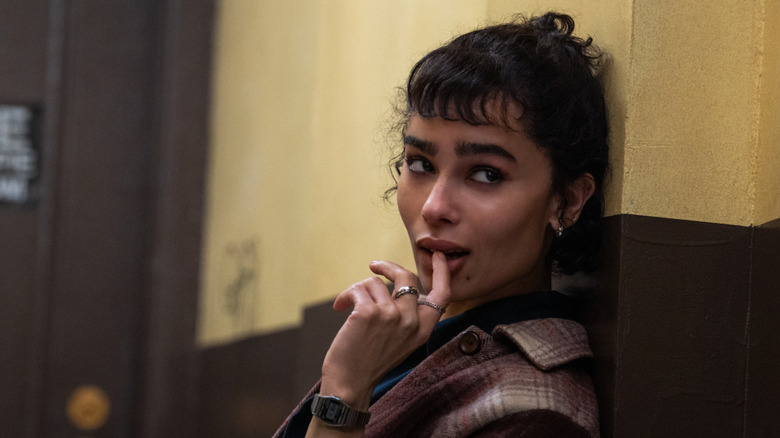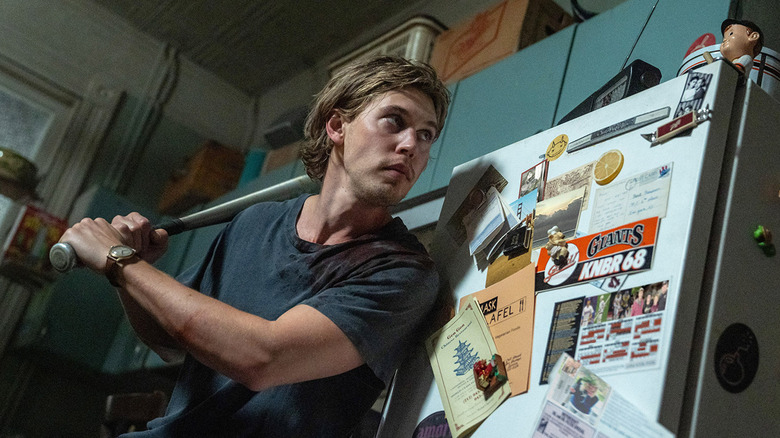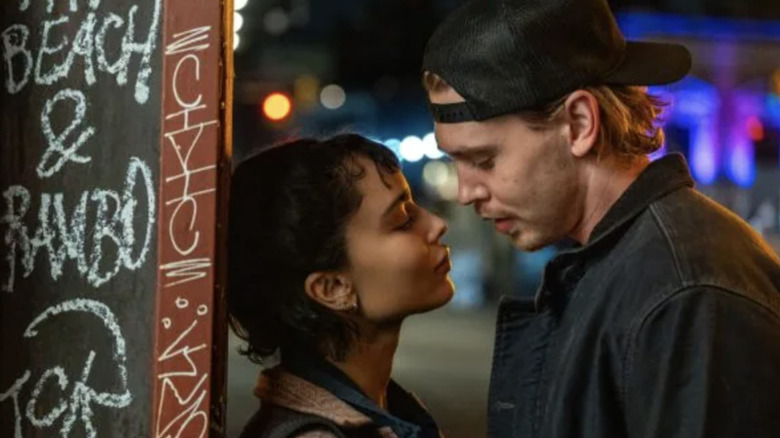Spoilers comply with.
In mainstream Hollywood motion pictures, and particularly style movies, there exists an unstated contract between the film and the viewers relating to a contented ending. To make certain, the goalposts on this have moved round wildly over the a long time, particularly after the collapse of the Manufacturing Code meant that American movies needn’t conform to staunch morality or feel-good vibes. One of many causes that the traces between an ordinary “completely happy” ending and an applicable one have blurred is because of a deeper normal understanding of style — in different phrases, audiences now understand {that a} Western a few gunslinger might finish within the character’s demise, simply as a noir a few morally corrupt gumshoe is not going to be all smiles in the long run. Nonetheless, the presumption exists, and thus a film which appears to deviate from this unstated promise
With “Caught Stealing,” the newest movie from director Darren Aronofsky, that contract is damaged when the movie’s hapless Everyman hero, Hank (Austin Butler), rushes to the house of his girlfriend, Yvonne (Zoë Kravitz), solely to find that he is too late and one of many very dangerous criminals that he is discovered himself blended up with have murdered her. It is a twist which seems like a violation on a number of ranges. Firstly, Aronofsky and author Charlie Huston (who adapts his 2004 novel of the identical title) are taking part in quick and free with the movie’s tone, making it appear enjoyable and frivolous whereas permitting darker parts to creep in. Yvonne’s homicide is, in fact, the place that exact worm turns, and telegraphs to the viewers that this is not going to be a lighthearted crime romp, however as an alternative is a moodier and extra brutal noir. Secondly, Yvonne’s dying looks like it may be an occasion of the “fridging” trope, a time period coined by Gail Simone which is brief for “Ladies in Fridges,” named for an notorious situation of the “Inexperienced Lantern” comedian e-book. Briefly, the time period refers to a trope the place violence accomplished to feminine characters is solely used as emotional motivation for the male protagonist.
Whereas Yvonne’s dying in “Caught Stealing” seems to adapt to this trope on the floor, it is really way more vital than merely offering emotional stakes. The movie is trying to inform a narrative filled with outrageous incidents whereas remaining gritty and grounded, a stability which makes it fairly distinctive within the panorama of crime movies, as most have a tendency to select a lane fairly than stroll in-between. Yvonne’s homicide is one thing which does not simply inspire Hank, however informs your entire climax of the movie. In different phrases, whereas the selection to kill Yvonne is controversial, the film doesn’t work with out it.
Hank finds his killer intuition in exacting justice for Yvonne
“Caught Stealing” accommodates quite a lot of tropes which can be widespread to Aronofksy’s movies, chief amongst them the idea of a persecuted protagonist. That is mixed with plenty of the noir/crime story tropes that Huston brings over from his supply novel, leading to Hank Thompson having a a lot tougher time bodily, emotionally, and spiritually than your common “man will get in over his head” story. This arc is in and of itself a subversion, as Aronofsky and Huston appear to arrange the movie as a lighthearted romantic journey romp: Hank, a mild-mannered bartender, solely will get concerned in a quest for a lacking pile of money that entails a number of aspects of NYC’s underworld as a result of his roommate, Russ (Matt Smith), leaves the nation as a result of a household emergency and forces Hank to maintain his cat whereas he is gone. It is all a case of mistaken intentions and dangerous timing, as Russ wasn’t trying to tear off his companions within the huge money haul, however they assume his leaving signifies that, and Hank simply via happenstance has ended up holding the important thing to the treasure.
It is a plot filled with mistaken identities and escalating circumstances that might look like headed towards farce, a la “A Fish Known as Wanda,” “The Complete 9 Yards,” or “Recreation Night time.” “Caught Stealing,” as deliberately comedic as it’s, doesn’t wish to be that sort of movie, in the end, and it is Yvonne’s homicide which makes that plain. Yvonne’s homicide could also be merciless of the movie in the way in which it pulls the rug from below the viewers hoping for extra of the couple’s chemistry, however it’s not prurient, because it happens off-screen. It is also not incidental, because it units the tonal and emotional stakes for each the film and for Hank himself. In contrast to different crime movies, Hank isn’t a former (or present) skilled cop or legal; he is a median man, and has by no means killed anybody in his life (deliberately, anyway — extra on that in a second). Thus, a number of hardened killers within the movie, particularly Detective Roman (Regina King) and the Orthodox Jewish duo Shmully (Vincent D’Onofrio) and Lipa (Liev Schreiber), confidently consider that Hank is not any killer. They’re proper, and but Lipa and Shmully — who’re in any other case good Jewish boys who love their mom and observe their religion — hold reminding Hank that the world is corrupting and that killing is a no-more-complex matter than pulling the set off. When Hank discovers that the duo had been chargeable for Yvonne’s dying, his intentional murder-by-car-crash of them feels extra weighted, extra important, and extra simply than it will if Hank had been a seasoned killer.
Yvonne’s dying retains Hank from all the time crashing in the identical automotive
After all, it is true that Yvonne’s sudden exit from the movie leaves her character feeling incomplete, regardless of a quick second on the finish of her remaining scene when Kravitz signifies that maybe Yvonne was prepared to “go deeper” in her relationship with Hank as she alluded to earlier within the movie. Sure, her dying is used to inspire Hank when it comes to growing his worry, nervousness, grief, loss, and in the end, want for revenge. It additionally motivates the ending of the movie, and permits the event of Hank in addition to the closure of the plot to fully align. All through the film, Hank has been proven as well-meaning however irresponsible, working from dedication and his deeper feelings, which is one thing that Yvonne was attempting to get him to repair. It seems that Hank’s points stem from a tragic incident in his previous, whereby he and his highschool baseball crew buddy, Dale (D’Pharaoh Woon-A-Tai) had been ingesting whereas he was driving, and the automotive accident that resulted left the automobile wrapped round a pole, Hank’s knee broken, and Dale lifeless. Hank suffers from recurring nightmares in regards to the crash, and has refused to get behind the wheel of a automotive since. It is solely via his experiences within the movie that he is lastly capable of take accountability for the life he took, as unintentional as it could have been.
In one other intelligent subversion, Aronofsky and Huston present a pretend decision to the movie simply earlier than its precise climax. Having eradicated the criminals attempting to kill and/or body him, Hank lastly will get behind the wheel, driving Lipa and Shmully house (who’re abstaining from driving in observance of the Shabbos), the lads promising they’re going to go away Hank alone and provides him a pair hundred grand for his troubles. That is when Lipa pulls out the distinctive gun cigarette lighter that was once Yvonne’s, telling Hank and the viewers that they are chargeable for her homicide. Thus, Hank enacts murderous retribution the one method he is aware of how: by deliberately crashing the automotive right into a pole. It is a second which brings each main thematic thread of the movie and the character collectively: Hank takes accountability as an alternative of the straightforward method out, he finds his ethical rationale for killing, he makes peace together with his previous and he faces it by primarily re-enacting it. None of this might work emotionally or logically with out the lack of Yvonne, which proves that her dying, though robbing the movie of an ideal actress giving an enthralling efficiency, is each vital and essential to the story. Whereas the selection can nonetheless completely be disliked and criticized, it isn’t a frivolous or irresponsible one.




